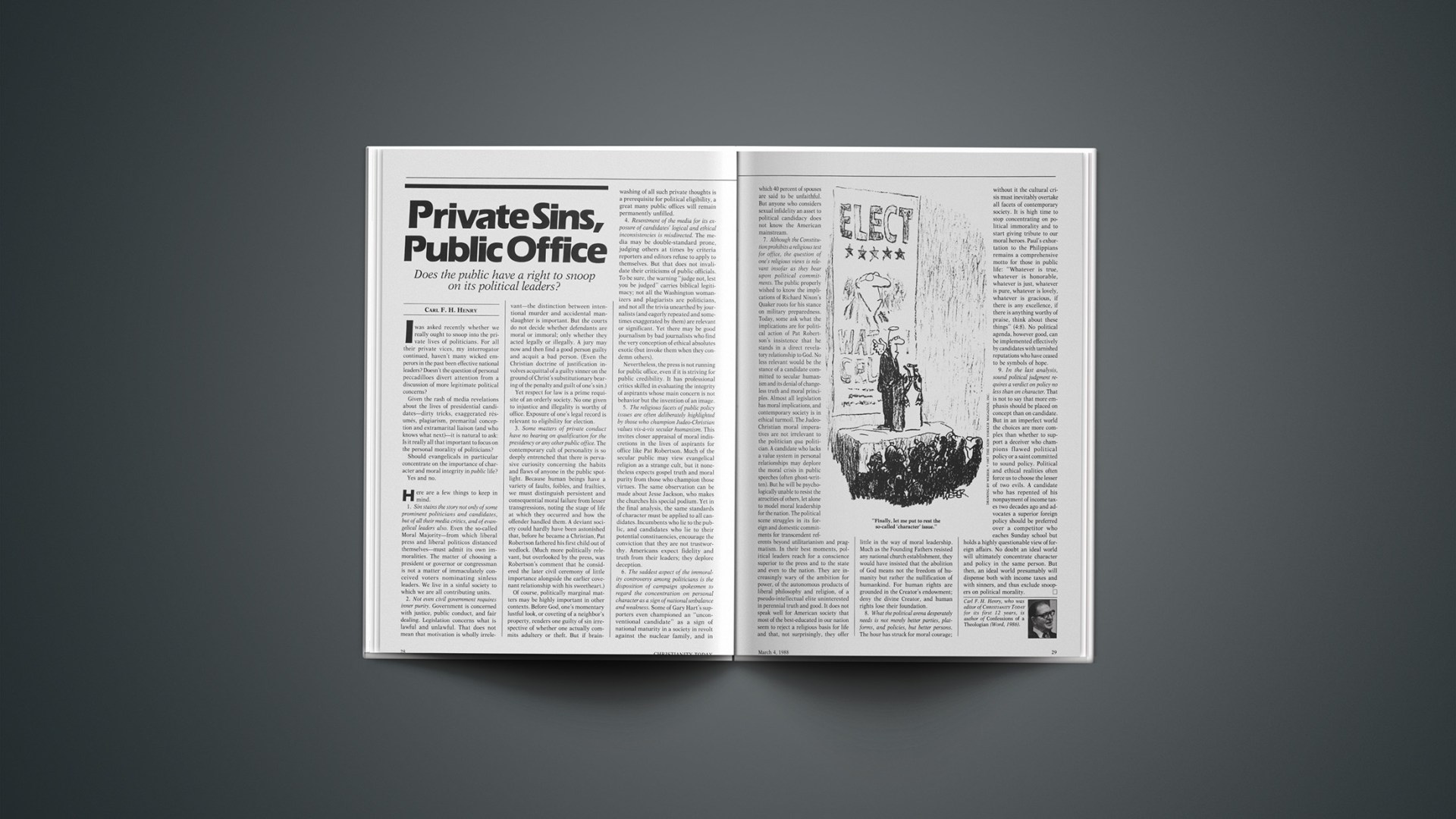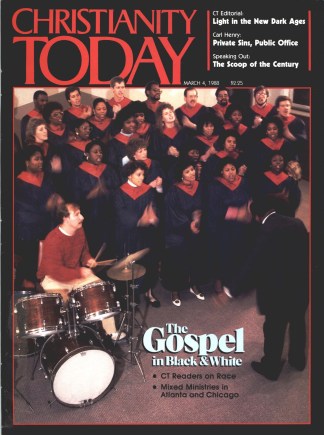I was asked recently whether we really ought to snoop into the private lives of politicians. For all their private vices, my interrogator continued, haven’t many wicked emperors in the past been effective national leaders? Doesn’t the question of personal peccadilloes divert attention from a discussion of more legitimate political concerns?
Given the rash of media revelations about the lives of presidential candidates—dirty tricks, exaggerated résumés, plagiarism, premarital conception and extramarital liaison (and who knows what next)—it is natural to ask: Is it really all that important to focus on the personal morality of politicians?
Should evangelicals in particular concentrate on the importance of character and moral integrity in public life?
Yes and no.
Here are a few things to keep in mind.
1. Sin stains the story not only of some prominent politicians and candidates, but of all their media critics, and of evangelical leaders also. Even the so-called Moral Majority—from which liberal press and liberal politicos distanced themselves—must admit its own immoralities. The matter of choosing a president or governor or congressman is not a matter of immaculately conceived voters nominating sinless leaders. We live in a sinful society to which we are all contributing units.
2. Not even civil government requires inner purity. Government is concerned with justice, public conduct, and fair dealing. Legislation concerns what is lawful and unlawful. That does not mean that motivation is wholly irrelevant—the distinction between intentional murder and accidental manslaughter is important. But the courts do not decide whether defendants are moral or immoral; only whether they acted legally or illegally. A jury may now and then find a good person guilty and acquit a bad person. (Even the Christian doctrine of justification involves acquittal of a guilty sinner on the ground of Christ’s substitutionary bearing of the penalty and guilt of one’s sin.)
Yet respect for law is a prime requisite of an orderly society. No one given to injustice and illegality is worthy of office. Exposure of one’s legal record is relevant to eligibility for election.
3. Some matters of private conduct have no bearing on qualification for the presidency or any other public office. The contemporary cult of personality is so deeply entrenched that there is pervasive curiosity concerning the habits and flaws of anyone in the public spotlight. Because human beings have a variety of faults, foibles, and frailties, we must distinguish persistent and consequential moral failure from lesser transgressions, noting the stage of life at which they occurred and how the offender handled them. A deviant society could hardly have been astonished that, before he became a Christian, Pat Robertson fathered his first child out of wedlock. (Much more politically relevant, but overlooked by the press, was Robertson’s comment that he considered the later civil ceremony of little importance alongside the earlier covenant relationship with his sweetheart.)
Of course, politically marginal matters may be highly important in other contexts. Before God, one’s momentary lustful look, or coveting of a neighbor’s property, renders one guilty of sin irrespective of whether one actually commits adultery or theft. But if brainwashing of all such private thoughts is a prerequisite for political eligibility, a great many public offices will remain permanently unfilled.
4. Resentment of the media for its exposure of candidates’ logical and ethical inconsistencies is misdirected. The media may be double-standard prone, judging others at times by criteria reporters and editors refuse to apply to themselves. But that does not invalidate their criticisms of public officials. To be sure, the warning “judge not, lest you be judged” carries biblical legitimacy; not all the Washington womanizers and plagiarists are politicians, and not all the trivia unearthed by journalists (and eagerly repeated and sometimes exaggerated by them) are relevant or significant. Yet there may be good journalism by bad journalists who find the very conception of ethical absolutes exotic (but invoke them when they condemn others).
Nevertheless, the press is not running for public office, even if it is striving for public credibility. It has professional critics skilled in evaluating the integrity of aspirants whose main concern is not behavior but the invention of an image.
5. The religious facets of public policy issues are often deliberately highlighted by those who champion Judeo-Christian values vis-a-vis secular humanism. This invites closer appraisal of moral indiscretions in the lives of aspirants for office like Pat Robertson. Much of the secular public may view evangelical religion as a strange cult, but it nonetheless expects gospel truth and moral purity from those who champion those virtues. The same observation can be made about Jesse Jackson, who makes the churches his special podium. Yet in the final analysis, the same standards of character must be applied to all candidates. Incumbents who lie to the public, and candidates who lie to their potential constituencies, encourage the conviction that they are not trustworthy. Americans expect fidelity and truth from their leaders; they deplore deception.
6. The saddest aspect of the immorality controversy among politicians is the disposition of campaign spokesmen to regard the concentration on personal character as a sign of national unbalance and weakness. Some of Gary Hart’s supporters even championed an “unconventional candidate” as a sign of national maturity in a society in revolt against the nuclear family, and in which 40 percent of spouses are said to be unfaithful. But anyone who considers sexual infidelity an asset to political candidacy does not know the American mainstream.
7. Although the Constitution prohibits a religious test for office, the question of one’s religious views is relevant insofar as they bear upon political commitments. The public properly wished to know the implications of Richard Nixon’s Quaker roots for his stance on military preparedness. Today, some ask what the implications are for political action of Pat Robertson’s insistence that he stands in a direct revelatory relationship to God. No less relevant would be the stance of a candidate committed to secular humanism and its denial of changeless truth and moral principles. Almost all legislation has moral implications, and contemporary society is in ethical turmoil. The Judeo-Christian moral imperatives are not irrelevant to the politician qua politician. A candidate who lacks a value system in personal relationships may deplore the moral crisis in public speeches (often ghost-written). But he will be psychologically unable to resist the atrocities of others, let alone to model moral leadership for the nation. The political scene struggles in its foreign and domestic commitments for transcendent referents beyond utilitarianism and pragmatism. In their best moments, political leaders reach for a conscience superior to the press and to the state and even to the nation. They are increasingly wary of the ambition for power, of the autonomous products of liberal philosophy and religion, of a pseudo-intellectual elite uninterested in perennial truth and good. It does not speak well for American society that most of the best-educated in our nation seem to reject a religious basis for life and that, not surprisingly, they offer little in the way of moral leadership. Much as the Founding Fathers resisted any national church establishment, they would have insisted that the abolition of God means not the freedom of humanity but rather the nullification of humankind. For human rights are grounded in the Creator’s endowment; deny the divine Creator, and human rights lose their foundation.
8. What the political arena desperately needs is not merely better parties, platforms, and policies, but better persons. The hour has struck for moral courage; without it the cultural crisis must inevitably overtake all facets of contemporary society. It is high time to stop concentrating on political immorality and to start giving tribute to our moral heroes. Paul’s exhortation to the Philippians remains a comprehensive motto for those in public life: “Whatever is true, whatever is honorable, whatever is just, whatever is pure, whatever is lovely, whatever is gracious, if there is any excellence, if there is anything worthy of praise, think about these things” (4:8). No political agenda, however good, can be implemented effectively by candidates with tarnished reputations who have ceased to be symbols of hope.
9. In the last analysis, sound political judgment requires a verdict on policy no less than on character. That is not to say that more emphasis should be placed on concept than on candidate. But in an imperfect world the choices are more complex than whether to support a deceiver who champions flawed political policy or a saint committed to sound policy. Political and ethical realities often force us to choose the lesser of two evils. A candidate who has repented of his nonpayment of income taxes two decades ago and advocates a superior foreign policy should be preferred over a competitor who eaches Sunday school but holds a highly questionable view of foreign affairs. No doubt an ideal world will ultimately concentrate character and policy in the same person. But then, an ideal world presumably will dispense both with income taxes and with sinners, and thus exclude snoopers on political morality.
Carl F. H. Henry, who was editor of Christianity Today for its first 12 years, is author of Confessions of a Theologian (Word, 1986).









